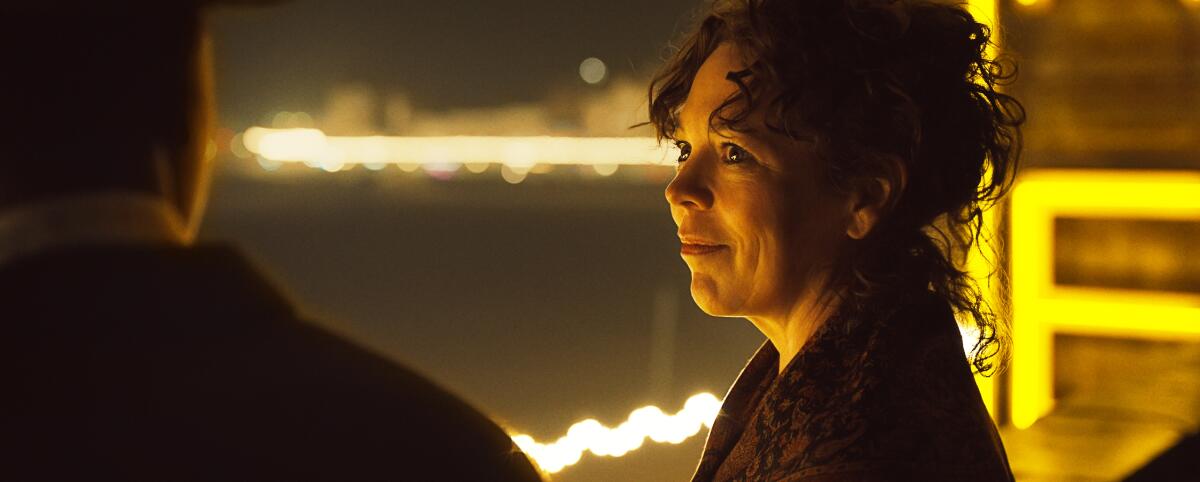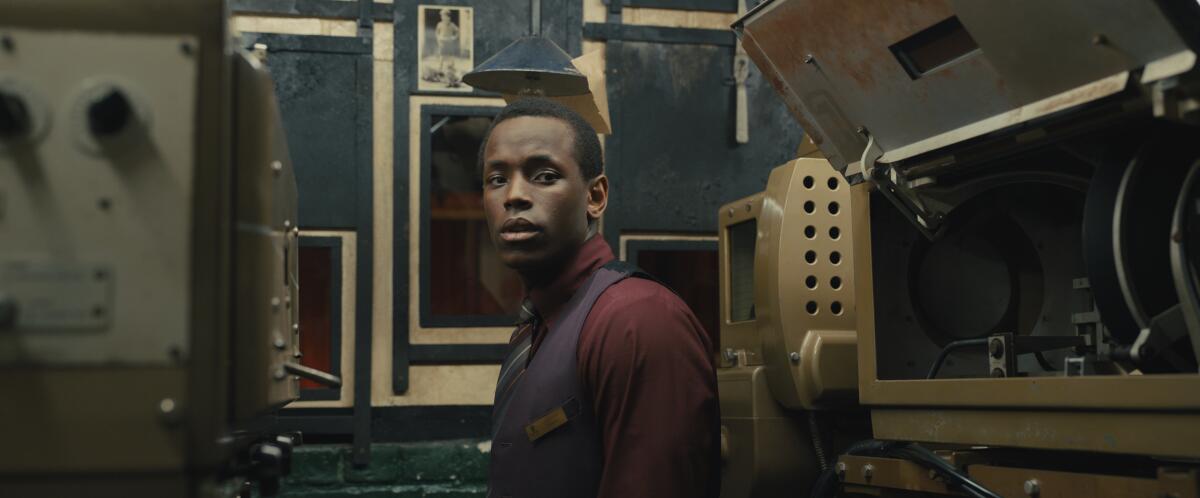Review: Movies may be magic, but Sam Mendes’ ‘Empire of Light’ can’t conjure the illusion

- Share via
In “Empire of Light,” Sam Mendes casts a nostalgic eye toward the movies. Like several other auteurs this winter season, Mendes has crafted what could be considered a “love letter to cinema” (see also: Steven Spielberg’s “The Fabelmans,” Damien Chazelle’s “Babylon”), but “Empire of Light” is less of a mash note to moviemaking than a tribute to the movie theater itself, that cathedral of collective dreams borne by a single beam of light.
The Empire in question is the fictional Empire Cinema in Margate, a coastal city in England; the year is 1980 and the story concerns the unlikely, and complicated, friendship between Hilary (Olivia Colman), the duty manager at the Empire, and Stephen (Micheal Ward), the new ticket taker. Movies are their business, and the backdrop to their relationship, which blooms among the popcorn and candy and takes flight in the Empire’s abandoned upstairs club room, a once-glorious space now serving as a pigeon roost.
For your safety
The Times is committed to reviewing theatrical film releases during the COVID-19 pandemic. Because moviegoing carries risks during this time, we remind readers to follow health and safety guidelines as outlined by the CDC and local health officials.
“Empire of Light” is beautifully shot by legendary cinematographer Roger Deakins, who contrasts the blueish seaside exterior light with the warm, rich interior of the Empire outfitted in golds and reds, the staff clad in aubergine. It is a gorgeous film, at once airy and earthy, the proud, yet crumbling glamour of the Empire placing us in this moment in time.
Funnily enough, “Empire of Light” shares some story DNA with another workplace movie that takes place at an “Empire”: “Empire Records,” that mid-‘90s romp about a group of misfit teens working at a record store. Both films take place at a business dedicated to a physical space where fans come to worship their art form of choice, and where the employees form an oddball family, contending with their various personal issues. In “Records,” a corporate takeover threatens obsolescence, and though that hasn’t quite arrived yet in “Light,” it’s clear Mendes, setting the film four decades ago, is reckoning with the possible extinction of the movie theater in his own way.
As to the employee issues, Mendes, writing alone for the first time (he previously co-wrote “1917”), saddles Hilary and Stephen with some heavy-duty personal obstacles that reflect the social plagues of the time. Hilary contends with an ongoing mental health crisis stemming from gender-based trauma (see the “woman = woe man” graffiti on the walls of her squalid apartment), while Stephen, the son of Caribbean immigrants, has to shoulder the burden of racism building in Thatcher’s England, where skinheads are emboldened to attack. At one point, he despairingly lists a spate of racist incidents to Hillary after an ugly encounter with an aggressive patron. It feels less like realistic dialogue and more like Mendes attempting to set the context.

The story feels like a mashing together of these social ills with various references to influential films of the era (“Stir Crazy,” “Chariots of Fire,” “Raging Bull”), music (The English Beat, Joni Mitchell, Cat Stevens), and a few favorite poets (W.H. Auden and Philip Larkin), while the cinema setting offers the opportunity to wax poetically about the magic of projected celluloid (Toby Jones plays the wise projectionist Norman). But Mendes ends up making the misguided, and flat, argument that movies can treat mental illness, and ska music can fight racism.
For movie lovers and appreciators of the experience of 35-millimeter film projected in a beautiful old movie house, it’s easy to understand where Mendes is coming from, and to agree with his assertions. But as a movie lover wanting to fall in love with a story, “Empire of Light” does not provide that experience. Deakins’ work is beautiful, Colman is incredible, and the role of Stephen proves to be a breakout for Ward. But the story is too scattershot and contrived for an audience to be swept away and moved in the same way that Colman finds herself swept away by the experience of the Peter Sellers classic “Being There.”
We don’t need someone to remind us that movies are magic by stating that up front, usually it’s the magic of storytelling itself that achieves that, which “Empire of Light” ultimately, and unfortunately, fumbles.
Katie Walsh is a Tribune News Service film critic.
‘Empire of Light’
Rated: R, for sexual content, language and brief violence
Running time: 1 hour 59 minutes
Playing: Starts Dec. 9 in general release
More to Read
Only good movies
Get the Indie Focus newsletter, Mark Olsen's weekly guide to the world of cinema.
You may occasionally receive promotional content from the Los Angeles Times.










